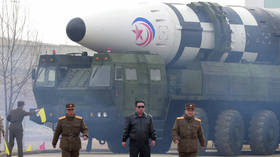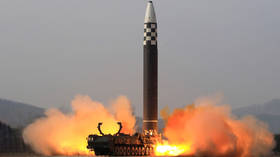North Korea makes ‘striking capabilities’ pledge

North Korean leader Kim Jong-un warned on Monday that his country will continue developing “powerful striking capabilities.”
The statement comes several days after Pyongyang claimed it had test-fired an intercontinental ballistic missile (ICBM), the first time since 2017 that this type of a long-range missile was launched.
Only “formidable striking capabilities” and “overwhelming military power” can guarantee security against “all threats and blackmails by the imperialists,” Kim Jong-Un announced at the photo session dedicated to last Thursday’s test-fire of what was reportedly the DPRK’s largest ICBM, Hwasong-17. He added that the DPRK would “continue to attain the defense up-building goal and develop much more powerful striking capabilities” to equip the country’s military, state-run news agency KCNA reports.
The missile reportedly traveled 1,090km (677 miles) before landing in the Sea of Japan, known to Koreans as the East Sea. Kim personally oversaw the test. The weapon adds to the country’s nuclear arsenal aimed at “humbling” Washington, KCNA said. The ICBMs are long-range weapons, allegedly capable of reaching the US.
Since the beginning of the year, Pyongyang has conducted over a dozen test launches, apparently at least two of those launches – on February 27 and March, involved Hwasong-17, the largest missile of its kind developed by DPRK.
Outgoing South Korean President Moon Jae-in condemned the latest test, saying it violated the moratorium that Pyongyang announced in 2017. South Korea test-fired several missiles on Thursday, in an apparent response.
Talks regarding the North Korean nuclear program largely fell apart after a no-deal summit between Kim and then-US President Donald Trump in Hanoi, Vietnam in 2019. Back then the denuclearization of the Korean peninsula had been at the top of the list of US foreign-policy priorities.
The Biden administration has been calling on Pyongyang to resume talks without preconditions, but DPRK argues that Washington should change its aggressive stance first. Since the talks stalled, Pyongyang has been consistently expanding its military capabilities.













